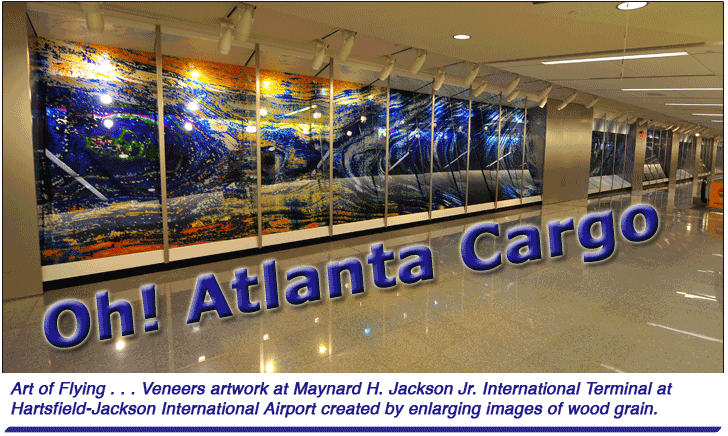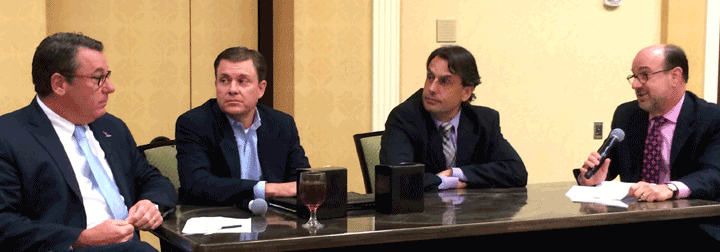Oh! Atlanta Cargo

The June get-together at the
Atlanta Air Cargo Association featured a panel moderated by Airforwarders
Association Executive Director Brandon Fried, Delta Air Lines’ Vice
President Global Cargo Sales Ray Curtis, Southwest’s Senior Director
of Cargo & Charters Wally Devereaux, and Qatar Airways’ Ian
Morgan [formerly with Centurion and Cargolux].
The topics predictably ranged from the ubiquitous e-freight
to ACAS, the business climate, airline mergers, lithium batteries, and
what’s hot in terms of products. Three rather different points of
view were represented, reflecting the respective cargo business of the
panelists’ airlines—a predominantly U.S. domestic narrow body
carrier exclusively using B737; a global combination airline operating
750 passenger aircraft and no freighters; and an aggressive Gulf-based
airline operating 7 B777F and three A330F, in addition to its passenger
aircraft fleet totaling 131 aircraft.

From Left to right—Ray Curtis,
Wally Devereaux, Ian Morgan and Brandon Fried.
|
It was almost amusing to hear Wally
Devereaux’s frank description of the Southwest cargo operation—freight
just shows up and gets carried; no complications involved, just getting
it to its destination. “We are so far behind we are ahead”
is how he summed up where Southwest cargo stands in terms of e-freight,
however, international flight to Aruba, Jamaica, and the Bahamas will
require ramping up capabilities.
Ray Curtis mentioned the investment in technology required
and the multiple pipes needed in cargo compared with a single platform
in the passenger business. Asked about the interaction with smaller forwarders,
Curtis said Delta Air Lines has an application to serve this market segment,
enabling forwarders to complete whatever they needed to do to facilitate
e-freight. Mike White, CNS director-Facilitation, Security & Standards
remarked that indeed, Delta is the number one e-freight airline out of
the U.S., but also that some forwarders are going through major IT platform
changes.
Ian Morgan stated that QR has a 40 percent e-AWB target but
in a conservative industry there is a need to constantly drive forward
and change. He added that different Customs requirements and interfaces
in various countries remain a problem.
Fried couldn’t resist repeating his standard query
about whether e-freight and e-AWB really do benefit the forwarders or
whether it is only an advantage for the airlines. As Morgan told the audience,
having a single electronic record brings about efficiencies and replaces
multiple documents, not to mention a faster transaction timeframe. Accuracy
of billing was another clear benefit, according to Curtis.
Fried asked the panel whose business was better today, and
Devereaux responded that the modal shift was slowly tilting back toward
airfreight. Curtis commented that interest rates had a direct bearing
on business, and while very low, this allows inventories to be resupplied
using ocean freight, and higher rates will grow airfreight. Morgan observed
that business is demand based, but this has always been cyclical.
Attendants at the AACA had copies of the CNS Focus spring
edition on each chair, which contained no less than 2 articles on lithium
batteries and a third on dangerous goods that also mentioned lithium batteries.
While Fried brought it up, it was surprising that no one mentioned that
ICAO is progressing [a] “recommendation… total prohibition
on passenger aircraft until such time as the data supporting safe transport
is available.” FT has repeatedly reported
in detail about the matter and the challenges faced when handling this
commodity.
In closing, Fried asked the panel to list their top concerns
going forward, which prompted Morgan to respond that, in his view, security
remains both the biggest concern and threat. Devereaux listed quality
of service and executing from point A to point B as promised, while Curtis
thought that reducing the time airfreight spends in transit would improve
its value proposition.
Ted/Flossie |





